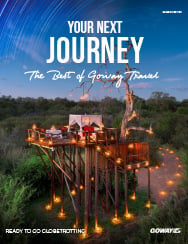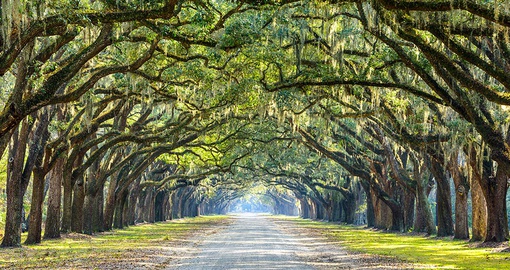The Civil Rights History Trail: Nashville, Memphis, Selma, Montgomery & More
- Duration
- 14 Days
- Prices From:
- US$ 2,409
MODERATE | SELF DRIVE: A trip full of captivating scenery and rich southern ambience, but fully focused on an, often, chilling theme: the Civil Rights History Trail. It’s a thought-provoking journey as you visit places such as Oxford, Jackson, Selma, Scottsboro, and Montgomery, but also Atlanta and Memphis, two cities that are forever associated with Martin Luther King Jr. The trip tells a story that must be told and reveals fascinating details at every stop. Memphis and Nashville, both eminent musical capitals of the south, provide engaging moments to round out the trip.
This 14-day tour immerses you in the power of the Civil Rights movement, as you trace the trailblazing steps made by America’s bravest activists and pay homage to those whose names are engraved in history. You’ll pick up your car in Nashville for a trip down the highways of the American South, including stops in Memphis, Jackson, Montgomery, Savannah, Atlanta, Birmingham, and more.
The history of the American Civil Rights movement is one that involved many Black-led peaceful sit-ins and marches met with violence, as white nationalists sought to protect their power through discrimination and segregation. In Nashville, take a front-row seat at Woolworth restaurant, one of the locations of the historic sit-in protests to end segregation at lunch counters. Commemorate the events and sacrifices that led to desegregated Nashville at the Witness Walls before continuing downtown to get a taste of famous southern-style cuisine while enjoying the city’s flourishing country and bluegrass scene.
Allow the neon lights of Beale Street to draw you to Memphis, the music capital of the United States and the Birthplace of Rock n’ Roll. America has long marched to the beat of iconic Beale Street, three blocks of nightclubs, restaurants, and shops where jam sessions go late into the night and African-American musicians put blues, jazz, rock ‘n’ roll, R&B, and gospel on the map. The Stax Museum of American Soul Music is your one-shop stop to trace music’s history in the south, from church hymns to the anthems that rang through the streets during Civil Rights marches.
In Mississippi, you’ll learn how violence was countered with cries for justice after stops in Oxford, Money, Sumner, Philadelphia, and Jackson. In Money, visit the ruins of Bryant’s Grocery & Meat Market to pay your respects to Emmett Till, the African-American teenager whose racially-motivated murder ignited the fires of the Civil Rights movement after much public outcry. Learn how racial politics entered higher education through the resilient history of the University of Mississippi’s first black student in Oxford and tour Jackson’s Tougaloo College, a historically black college that led many successful acts of civil disobedience in the mid-20th century. Jackson lives up to its name as the “City of Soul”, where you can feast on some of the nation’s best seafood, barbecue, and soul food after visiting several stops on Mississippi’s Freedom Trail.
Alabama is synonymous with Civil Rights struggle, as both home to Rosa Parks’ brave refusal to give up her seat for a white woman and the Selma March led by Martin Luther King Jr. In Montgomery, tour the Rosa Parks Museum, the National Memorial for Peace and Justice, and Dexter Avenue King Memorial Baptist Church, where King organized the Montgomery Bus Boycott after Parks’ arrest. Birmingham is also an essential stop, as grounds for a violent turning point in the movement and town where MLK penned his famous “Letter From a Birmingham Jail”, whose words are still echoed today in conversations surrounding racial justice in the US. While its painful history may precede it, Birmingham is also a beautiful city with plenty of scenic overlooks from its location in the Appalachian foothills.
In Georgia, enjoy fresh seaside air in the coastal city of Savannah, considered one of the prettiest cities in the US with its cobblestone streets and colourful flowers that adorn its southern-style houses. Georgia is rich in African-American history, where you can visit both the home and Eternal Flame resting place of MLK in Atlanta. Contemplate the lives of courageous activists who have come before you with a stroll through World Peace Rose Garden or by taking in the colourful street art in the historic Sweet Auburn District.
At the end of your tour, return your rental car to the airport in Nashville for your returning flight or continue to explore the colourful cities and landscapes of the American south.
- Duration
- 14 Days
- Prices From:
- US$ 2,409
Itinerary View Trip Map
Nashville
Arrive at Nashville International Airport and transfer independently to your hotel. Depending on your time of arrival you might start to explore a little bit of this home to a history of civil rights heroes, country music and southern style. The Civil Rights Trail stretches across 14 U.S. states, encompasses more than 100 locations, and highlights the USA's civil rights history. You might start at Woolworth on 5th, a restaurant that pays homage to the Nashville sit-ins - nonviolent protests against segregated public places in the city in 1960. One of the sit-ins targeted the lunch counter in the Woolworth store, where the restaurant operates today in a meticulously restored building. To experience and feel the angst of this era of discrimination, try sitting at the symbolic lunch counter to read the sit-in protesters' Ten Rules of Conduct.
Overnight Nashville
| Duration | 1 night |
|---|
Nashville - Henning – Memphis
Before you depart Nashville check out the Civil Rights Room at the Nashville Public Library and visit the Davidson County Courthouse, where a peaceful march ended with then-Mayor Ben West conceding that segregation was immoral, the first step toward the city's desegregation of public facilities. Beside the courthouse are the Witness Walls, concrete murals featuring events, including Freedom Rides, marches and sit-ins that spurred desegregation in Nashville. Leaving Nashville head for Henning, about three hours away, to visit the Alex Haley Museum and Interpretive Center. The museum - the childhood home of the "Roots" author - is dedicated to African American history and contains a life-size replica of a slave ship. Afterwards make your way towards the Mississippi River and the entertaining city of Memphis. Time permitting, you can stop the Burkle Estate, known as the Slave Haven Underground Railroad Museum, once part of the Underground Railroad network, which helped people escape slavery. Exhibits include displays of slave auction advertisements, information about slave trade history and artifacts highlighting racial profiling of the time. The main feature is the dark cellar, where men and women hid for hours or days until riverboats were available to take them to safety and freedom in northern states.
Overnight Memphis
| Duration | 2 nights |
|---|
Memphis
There is lots more to discover about the civil rights history of Memphis, starting at the National Civil Rights Museum, constructed around the Lorraine Motel. Learn about key milestones in civil rights history, including Rosa Parks' refusal to give up her seat on a segregated bus, the Jim Crow segregation laws, the murder of 14-year-old Emmett Till and marches in Selma, Alabama. Appropriately, the final exhibit is Room 306 of the Lorraine Motel, re-created from 1968, where civil rights leader Martin Luther King Jr. was assassinated on April 4 on the balcony outside his room. Of course, it's impossible to visit Memphis and not include Beale Street, at one time the heart and soul of the city's African American culture, and now the entertainment hub for live music and great dining. Another worthy visit is The Stax Museum of American Soul Music a celebration of everything from church Gospel music to uplifting anthems that were the backbone of marches, giving hope to those fighting for civil rights. Stax Recording Studios was among the first to employ African-American artists, including Otis Redding and Isaac Hayes, giving a voice to Blues and Gospel music and becoming famous for launching their careers. Other must-see places on a tour of civil rights history in Memphis include the historic Beale Street Baptist Church, built by and for freed slaves in the late 1800s and a key meeting place for civil rights leaders through the ages. Ready to indulge in a Memphis menu, check out The Four Way, and order some hearty soul food: country fried steak, a catfish sandwich and turnip greens followed by sweet potato pie. Beginning in the 1940s, the restaurant was a meeting spot for civil rights activists as well as famous musicians such as B.B. King and Aretha Franklin due to its location near Stax Recording Studios.
Overnight Memphis
Memphis - Oxford - Sumner - Money - Jackson
About 90 minutes south of Memphis, make your first stop at the Oxford campus of the University of Mississippi and seek out the civil rights monument created by Oxford resident Rod Moorhead. The statue portrays James Meredith, the first African-American student to be admitted to the university, after his racial discrimination case was supported by the U.S. Supreme Court in 1962. President John F. Kennedy deployed 31,000 troops to quell protests and protect Meredith when he arrived at the school. Meredith graduated the following year with a Bachelor of Science degree. As you continue your drive to Jackson, you follow the 1966 "March Against Fear" route Meredith planned to walk alone to protest racism and the fear that kept black people from registering to vote. Near Hernando, a historical marker documents where he was shot three times by a white sniper on the second day. Over 15,000 supporters had joined the march by the time Meredith recovered and met them 20 days later in the state capital. Meanwhile, in Money, all that remains of Bryant's Grocery & Meat Market is the ruin of the storefront, but this is where Emmett Till, a 14-year-old from Chicago, Illinois, who was visiting relatives, came to purchase candy in 1955 and was accused of whistling at Carolyn Bryant, the 21-year-old white shopkeeper. Bryant's husband and his half-brother abducted Emmett, beat and shot him, then threw his body into the Tallahatchie River. Emmett's mother insisted on an open coffin at his funeral to highlight the savagery of the attack. The ensuing public outcry is credited with igniting the civil rights movement. To complete the saga of this event stop off in Sumner to see the Tallahatchie Courthouse, where the murder trial took place; both men were acquitted. Finish your day, driving south for another two hours, in Jackson.
Overnight Jackson
| Duration | 2 nights |
|---|
Jackson
Jackson has a wealth of civil rights history, beginning with the Mississippi Civil Rights Museum, opened in 2017. See archive film of protests and demonstrations as well as artifacts such as the rifle used to murder Medgar Evers at his home in 1963. The NAACP field secretary's house has been restored and is now the Medgar Evers Home Museum. North of Jackson, visit Tougaloo College. The historically black college was a hub of support for the civil rights movement, leading to the boycott of many Jackson businesses, protests against segregation and peaceful sit-ins. Drive past the Greyhound bus station on Lamar Street part of the continuing story. It has since been restored and was the catalyst for the Freedom Rides throughout the South after the arrests in 1961 of 27 riders who challenged racial segregation.
Overnight Jackson
Jackson - Philadelphia - Tuscaloosa
A short 90 minutes’ drive takes you to Philadelphia, site of the 1964 killings of three civil rights activists, one African American man and two white men, which became known as the Mississippi Burning murders. The national headlines provided the final push to pass the 1964 Civil Rights Act. Continue the trail to Tuscaloosa, where then-Alabama Gov. George C. Wallace stood at the entrance of the University of Alabama in 1963 to block the admission of two black students, determined to keep his promise for the university to remain segregated. President John F. Kennedy intervened, dispatching troops to protect the students, allowing them to enroll and sending a message to segregationists across the South. Known as the site of the "Stand in the Schoolhouse Door" incident, the university's Foster Auditorium became a National Historic Landmark in 2005.
Overnight Tuscaloosa
| Duration | 1 night |
|---|
Tuscaloosa - Selma - Montgomery
In the morning, drive south to reach Selma, the starting point of three 1965 right-to-vote marches. On March 7, about 600 marchers were met with violence from local law enforcement and vigilante gangs. News broadcasts countrywide of ‘Bloody Sunday’, coupled with the death of an activist after a march two days later, led to thousands of supporters converging on Selma. President Lyndon B. Johnson pledged support to the marchers on national TV and expedited the Voting Rights Act. On March 21, troops protected 8,000 marchers as they set out along U.S. Route 80, arriving three days later in Montgomery, where they were greeted by over 50,000 supporters. The path of their journey became a National Historic Trail in 1966. Montgomery had been thrust into the public conscience in 1955 by one African-American woman's refusal to give up her seat on a segregated bus, and visitors can see a 1955 city bus at the Rosa Parks Museum. Montgomery stayed at the forefront of the civil rights movement. It's home to the Dexter Avenue King Memorial Baptist Church, where Martin Luther King Jr. preached and organized the Montgomery Bus Boycott. A mural in the church's basement depicts King's life, beginning with his crusade for racial equality in Montgomery and ending in his untimely death in 1968 in Memphis, Tennessee.
Overnight Montgomery
| Duration | 1 night |
|---|
Montgomery - Tuskegee - Albany
It’s a short 40 minutes’ drive east to Tuskegee, home of the Tuskegee Airmen, the country's first African American military aviators, who fought in World II. Visit the Butler Chapel AME Zion Church, a 1950s meeting place for people fighting for voting equality in Alabama and arrange for a tour of the museum in the church's basement. Continue southeast to reach Albany, home of the Albany Movement, the first mass movement in the civil rights era to fight for the desegregation of an entire community. Martin Luther King Jr. lent his support, was arrested and said the campaign failed, but residents said many lessons learned led to successful campaigns elsewhere. You can learn more about this historic time at the interactive exhibits at the Albany Civil Rights Institute, where the Freedom Singers give monthly concerts.
Overnight Albany
| Duration | 1 night |
|---|
Albany - Midway - Savannah
Today you can enjoy the Georgia countryside as you drive east to the Atlantic Ocean coast. After about four hours, the first suggested stop is Midway to visit the museum at Historic Dorchester Academy, a key site where the Southern Christian Leadership Conference trained its teachers and leaders, who then took the message to their home communities. The final stop on today’s itinerary is Savannah, home of the Ralph Mark Gilbert Civil Rights Museum, which tells the story of the Savannah Protest Movement, where students staged sit-ins at downtown lunch counters in 1960, resulting in a boycott of businesses and leading to desegregation. It's housed in the building that once was the area's largest bank for blacks. Take the opportunity to stroll around lovely and historic Savannah, so charming with its cobblestone streets, pretty parks and squares, boutiques, and trendy restaurants.
Overnight Savannah
| Duration | 1 night |
|---|
Savannah - Atlanta
Today’s drive takes you to Atlanta the birthplace and the final resting place of Martin Luther King Jr at The King Center. Upon arrival, visit the new Center for Civil and Human Rights, a suitable place to begin your discovery of Atlanta's part in the history which includes the Martin Luther King Jr collections as well as exhibits about today's human rights issues. While you're downtown, suggested must-see attractions include the Georgia Aquarium, World of Coca-Cola and Centennial Olympic Park. This cosmopolitan city brims with great restaurants and lively nightlife hotspots.
Overnight Atlanta
| Duration | 2 nights |
|---|
Atlanta
Atlanta offers numerous touch points to continue to explore the civil rights history. The King Center, which includes an exhibition hall and the home where Martin Luther King Jr. was born, and Fire Station No. 6, which was one of the first firehouses in the South to be desegregated. Listen to some of King's sermons and speeches at Ebenezer Baptist Church, and then enjoy quiet contemplation at the nearby World Peace Rose Garden and reflecting pool, home to the ‘Behold’ monument. Visit the Eternal Flame and the crypts of King and his wife, Coretta, and explore the International Civil Rights Hall of Fame, where you can tread in the footprints of civil rights leaders and pioneers. Spend time in the Sweet Auburn District at the APEX Museum, which traces the African American experience through videos, photographs, and artifacts.
Overnight Atlanta
Atlanta - Anniston - Birmingham
Today you leave Atlanta and head towards Birmingham. Follow the westward route of the Congress of Racial Equality who boarded a Greyhound bus in 1961 to challenge segregated seating as part of the Freedom Rides movement. In Anniston, Alabama, an angry mob attacked the bus and slashed its tires, forcing it to stop outside of town. The bus was set on fire, and the fleeing riders were beaten. The site is marked with the Freedom Riders National Monument. Drive about an hour west to the final stop today, Birmingham, a city at the heart of the civil rights movement. The Birmingham Campaign, peaceful lunch counter sit-ins, boycotts and marches were met with such violence that they're widely accepted as the key turning points in the civil rights movement. Today, the Birmingham Civil Rights Institute tells the story of the city's role in the struggle for equality. Across the street, in Kelly Ingram Park, fire hoses and dogs were turned on peaceful protesters; it's now a site honoring leaders of the civil rights movement with statues and monuments. The nearby Civil Rights National Monument was established in 2017 to commemorate this important time in U.S. history. With its setting in the beautiful Appalachian foothills, Birmingham offers a wealth of outdoor recreation, dining, and entertainment options.
Overnight Birmingham
| Duration | 1 night |
|---|
Birmingham - Scottsboro - Nashville
Today is the last day of your journey through the history of the Civil Rights Trail. Scottsboro, a two-hour drive north from Birmingham is where nine black teenagers were falsely accused of the sexual assault of two white girls aboard a Southern Railroad freight train from Chattanooga to Memphis, Tennessee, in 1931. The ensuing trials, convictions, retrials, verdicts, appeals and blatant injustice accorded the boys was the basis for much legal reform for the right to a fair trial. Visit the Scottsboro Boys Museum & Cultural Center in the 133-year-old former Joyce Chapel United Methodist Church, it contains documents and other artifacts that support the trial as the beginning of the civil rights movement. Your journey ends where it began nearly two weeks ago when you make the three-hour drive back to Nashville.
Overnight Nashville
| Duration | 1 night |
|---|
Nashville
Return to Nashville International Airport to check in for your flight home unless you plan to extend your stay in Tennessee.
Other Information
DEPARTURES:
Daily departures: April 1, 2024 - March 31, 2025
PRICE INCLUDES:
- 14 days Intermediate Car Rental with unlimited mileage (Mazda 3 or similar)
- Detailed day by day itinerary
- 1 night moderate accommodations in Nashville
- 2 nights moderate accommodations in Memphis
- 2 nights moderate accommodations in Jackson
- 1 night moderate accommodations in Tuscaloosa
- 1 night moderate accommodations in Montgomery
- 1 night moderate accommodations in Albany
- 1 night moderate accommodations in Savannah
- 2 nights moderate accommodations in Atlanta
- 1 night moderate accommodations in Birmingham
- 1 night moderate accommodations in Nashville
PRICE EXCLUDES:
- Car rental insurance
- Travel insurance
- International and domestic airfare & airfare taxes
- Entrances fees to sites not explicitly listed as included
- Meals and beverages not mentioned
- Road tolls
- Gratuities
- Items of a personal nature
- Visa fees if applicable
TRIP HIGHLIGHTS:
- Go to the Burkle Estate, known as the Slave Haven Underground Railroad Museum, once part of the Underground Railroad network, which helped people escape slavery (optional)
- At The Four Way, order some hearty soul food – perhaps country fried steak, a catfish sandwich and turnip greens followed by sweet potato pie (optional)
- Visit the Butler Chapel AME Zion Church, a 1950s meeting place for people fighting for voting equality in Alabama, and arrange for a tour of the museum in the church’s basement (optional)
- Explore the wealth of civil rights history in Atlanta, starting at The King Center, which includes an exhibition hall and the home where Martin Luther King Jr. was born, and Fire Station No. 6, which was one of the first firehouses in the South to be desegregated (optional)
TERMS AND CONDITIONS:
Prices are "from" per person based on twin/double share accommodation and for travel in low season. Seasonal surcharges and blackout dates may apply. Limited seat/spaces and all pricing is subject to change and availability. Rates for single or triple travellers are available on request. Additional terms and conditions apply for car rental - please inquire.
1 Oct 2024


















